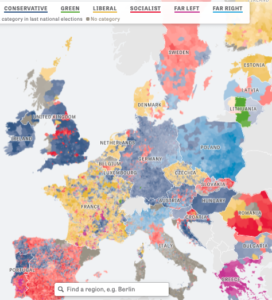European democracy

To make it worse, the elections happen through the national parties, although European democracy happens through the transnational European political parties: the European People’s Party (centre-right), the Party of European Socialists/Progressive Alliance of Socialists and Democrats (centre-left), the Alliance of Liberals and Democrats for Europe (liberal), the European Green Party (sitting as the Greens–European Free Alliance, which is the group the SNP is a member of), and so on.
The effect is that many of the European parties aren’t on the ballot paper everywhere. If you really like the EPP (the party of Tusk, Bariner and Juncker, for instance) but live in the UK, you have a problem because they don’t have any member parties there (the Tories used to be a member but left to join the Eurosceptic ECR instead), and similar problems exist in most countries.
Also, many European parties risk wasting votes because they run as several parties in some countries. For instance, in Scotland the SNP and the Greens are both members of the Greens/EFA group, but they’re running separately. And in Denmark, ALDE has two members: Venstre (The Liberal Party) and Det Radikale Venstre (the Social Liberal Party); Danish electoral law allows for electoral alliances, but the two parties haven’t formed one together – instead, Venstre have formed one with the Conservatives (EPP) and Liberal Alliance (European group unknown), and De Radikale have formed one with Alternativet (European Spring). It’s a mess.
Ideally the European parties should be on the ballot papers instead of the national parties everywhere, but that’s probably a step too far for now. But could we at least start listing the European party names on the ballot papers everywhere? And encourage parties that sit in the same group in the European Parliament to form electoral alliances with each other where it’s possible?
Some of the European parties are actually starting to get mentioned in the media – for instance I believe Guy Verhofstadt normally gets labeled as being the leader of ALDE or of the liberal group, not as being a member of Belgium’s VLD. But what good does that do if ALDE doesn’t get mentioned on the ballot paper where you live?
There are so many things we can do to improve European democracy.